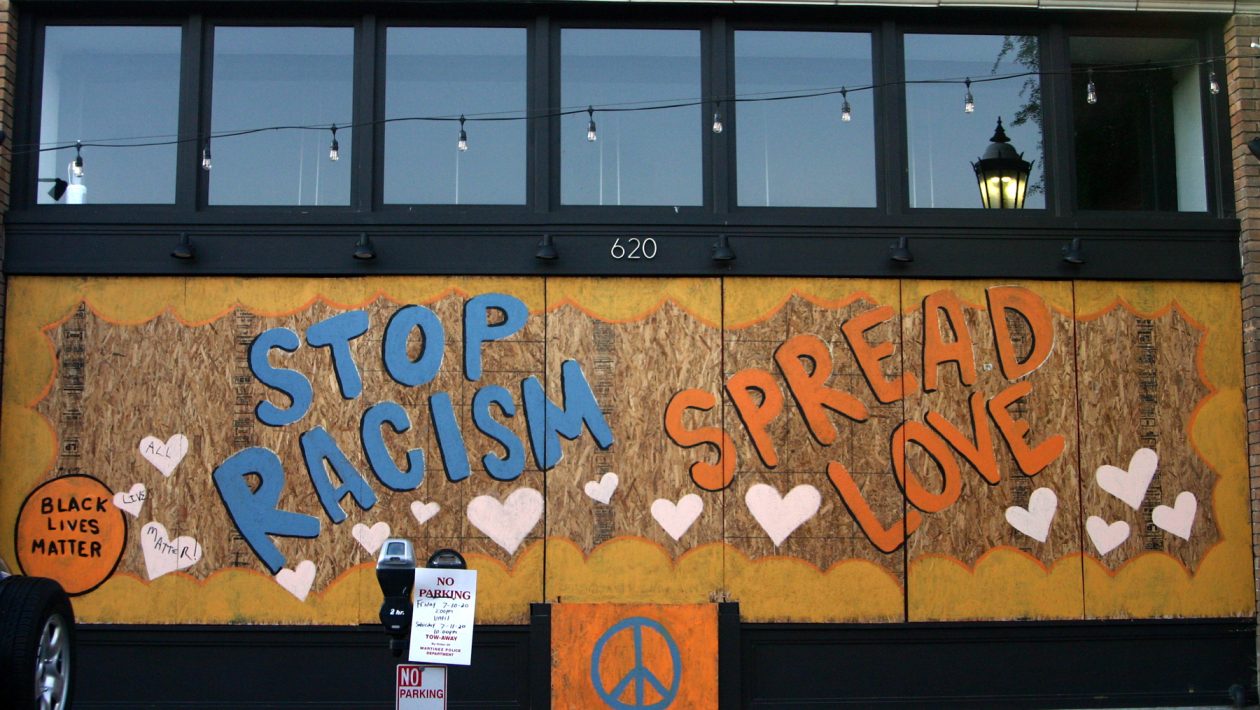For about three and a half hours Wednesday night, Martinez City Council heard speaker after speaker blend their advocacy for Black Lives Matter with calls for a citizen-run anti-discrimination task force and the defunding of Martinez Police Department.
Some described acts of brutality at the hands of “rogue” police and criticized how the city handled Sunday’s mostly peaceful demonstration and march, an event one speaker said was planned before racist flyers were discovered in June in Martinez, Bay Point, Pittsburg and Antioch.
Those flyers prompted the Council to adopt a new anti-racism resolution July 1. City Manager Eric Figueroa and his staff fast-tracked authorization of a Black Lives Matter mural painted July 4 on Court Street.
The mural and Martinez gained national attention when two residents attempted to paint over the lettering shortly after it was finished. The next day, a man waved a gun toward people standing around the painting. All three have been arrested and face charges in connection with their actions.
While some speakers praised the swift approval of the mural, which did not go through the city’s usual route of public airing before the Parks, Recreation, Marina and Cultural Commission and the Council, others said the city hasn’t gone far enough or acted with due speed.
Nakenya Allen called the Councilmembers’ responses “tone deaf.” She said she and other protesters were advised to stay home, but replied, “We don’t have that privilege.”
Natalie Moore said the Council’s words weren’t enough and called for it to take action.
Madelyn Stone said the current Councilmembers “have been around long enough” and urged them to step down.
“Martinez needs to make racism a priority,” one woman said. She was one of many who called for taking money from the police department’s budget to underwrite efforts to eliminate discrimination and prejudice.
Allocating money away from police was a popular theme among most of the speakers, some of whom criticized its “militarization,” its overtime expenses and any paid leaves for officers under investigation.
Many asked for money to be used instead on the city’s mentally ill, the homeless, education and other social services. Some asked that the city’s Community and Economic Development Department, which handles planning and zoning matters, get some of the money, too.
Part of the police budget already underwrites the Coordinated Outreach Referral, Engagement (CORE) team Martinez shares with Pleasant Hill, and Officer Rodney Brinser has been assigned full time to address homeless issues. Some speakers suggested Brinser should become a non-sworn city employee instead.
Another woman, who said she had participated in the Avon Walk, said “Black Lives Matter” should be no more political than “breast cancer,” and said Police Chief Manjit Sappal had “fanned the flames of fear” in his advisories prior to Sunday’s march.
Some criticized police for standing aside like a military guard while the marches and chanting took place, including one chant that suggested police officers and the Ku Klux Klan walked hand in hand. But others asked why officers and other city officials didn’t participate in the demonstration. “Are you afraid to take a knee?” Marlene Lerner-Bigley asked.
Roman Ruddick said he disagreed with the chief’s “alarmist use of power” Sunday, saying it demeaned the promises of black and brown organizers to keep the event peaceful. Like others, he said, “’Black Lives Matter’ shouldn’t be a political statement.”
Megan Leonard said she no longer feels safe in Martinez and asked why Wednesday’s agenda had no consideration of the citizens task force. Others noted that Sappal had said previously he is trying to organize a town hall on police issues despite COVID-19 restrictions, and asked when that would take place.
Wednesday’s meeting, like many since the beginning of the pandemic shut down orders, was conducted through Zoom. At one time, nearly 300 had logged on to watch the proceedings.
Zach Farley said neither nonwhites nor those of the LGBTQ gender identities feel safe in the town. He spoke of seeing a confederate flag as he went to school, and said just because some residents haven’t seen or experienced racism it didn’t mean it isn’t happening in Martinez.
Cameron Murtierrez, who said he grew up in Martinez, described an incident in which he was in his parked car, speaking to his insurance company, when he first was cursed and threatened by a Martinez Police officer, who then dragged him from the car and beat him. He spoke of seeing children sprayed with tear gas.
Ayla Rodriguez, who said she is 17, said racism is “alive and well” in Martinez, and told how her father, a local businessman, has been told to “go back to your country.” She said she’s heard similar insults when she walks her dog.
She said members of her family are trying to form a youth group and wants to encourage dialogue and a connection between Martinez’s youth and its older residents. “It’s important to come together,” she said.
Not all speakers agreed with detractors of the city and its police.
One woman, who identified herself as a lesbian and owner of businesses in Martinez and in Vallejo, praised Martinez Police for swift action when she’s needed help. In contrast, she said, one can call for police in Vallejo and not see an officer for an hour.
She said she and her family frequent downtown businesses, and she has never been made to feel uncomfortable.
Susan Gustofson urged residents to enroll in the community police academy once pandemic restrictions are loosened so the 10-week course can be offered again. She said both Sappal and his officers are approachable, and instead of being de-funded, they should be defended.
Arash Pakzad, a downtown business owner, said he is “all about Martinez,” and while he challenged the Council to do better or step down, he praised the police department’s leadership.
Historian Kristin Henderson, who often has had disagreements with the Council and police at past meetings, asked where many of the critical speakers have been during the past years. She defended Martinez, saying “This is not a racist city.”
Greg Dixon said Martinez’s “excellent” police department differs greatly from the police he knew in Long Beach, where he grew up. He pointed out that even with raises, local sworn officers are paid less than those in surrounding cities.
Other people cautioned against defunding police and the assigning of certain call types to non-police responders.
One woman, who said her father had been involved in the Civil Rights movement, praised police for remaining calm Sunday while hearing “horrible things” said about them. She worried if officers are replaced by social workers, they could find themselves in “high risk situations,” and could get hurt.
Carol Gonzales, whose family is of mixed race, said she frequently visits her Martinez relatives. She said she supports all races and gender identities, but objects to defunding police. She has been an emergency medical technician, and has needed police assistance when answering calls. She agreed that social workers could find themselves in harm’s way if they are the sole responders. Police, she said, “are your best defense.”
A male speaker said crime rose dramatically in New York after its police funding was slashed. He said he was disgusted by the chant that linked police and the Klan, and said a city that has a refinery and other local targets needs fully funded police.
Nina Breinig said the city’s 32 sworn officers are spread thin in covering a city of 38,000 in more than 12 square miles, and don’t need funding cut.
A woman who said she is 75, African American and originally from Arkansas, said she supports Martinez police and oppose department defunding. She joined those critical of the Black Lives Matter movement, saying it reminded her of brownshirt organizations of the pre-World War II era.
Mary Perez not only defended Martinez police but also Councilmember Lara DeLaney, who Perez said had been attacked. “These people don’t know you,” Perez said, praising DeLaney’s work with Contra Costa County. DeLaney is a senior deputy county administrator, a legislative coordinator and manager of the county’s Office of Reentry and Justice, which tries to reduce recidivism and help the formerly incarcerated have productive lives.
Dan Dorsett, a founder of Feet First, a program that focuses on building self-esteem and confidence using the principles of boxing, especially among the youth and victimized, said he has worked closely with Martinez police.
He said Sappal “wants to protect all the people in the community,” and said the city’s leaders “are doing their jobs.”
He said he disagreed with having outside organizations direct changes in Martinez. “Our character is how we change things.”
The Council clipped its agenda short, and the meeting still extended past midnight, even though each speaker was given two minutes to talk, instead of the customary three minutes.
Addressing its business agenda, the Council approved conditional certificates to Yerba Buena Logistic Services for cannabis distribution and a non-storefront retail cannabis business. The vote was 4-1 with Vice Mayor Mark Ross objecting.
If the company proceeds successfully with the two operations, they’ll be housed in Suite C of 4808 Sunrise Drive, next to Power Endurance Training Center, a gym that trains both adult and child athletes.
Mike Neal objected to the city putting another cannabis business, Velvet, formerly known as Firefly, next to his gym, which he said served so many youths through its various programs and athletic camps that it should be considered a youth center. Velvet is in Suite A.
A Bay Area native, Neal earned All-American honors at the University of Nebraska Kearney, and became a sports performance and speed coach for Gamespeed before branching out on his own.
Neal, who is African American, argued that his younger clients often are dropped off by their parents, and worried that the first application was coming during his first year of a five-year contract with the property owner.
However, in considering Firefly’s application, the Planning Commission and the City Council decided a youth center in Martinez should cater solely to minors, and approved the application. If both companies’ endeavors come to fruition, Neal’s business would be sandwiched between the two.
Neal did not speak Wednesday. But Ross expressed his concern that Martinez could lose a black-owned business if Yerba Buena’s applications were approved. While he did not object to the cannabis business, he said he disagreed with the location.
“I don’t think this is right,” he said.
Of the public members who did speak, Ruddick noted that people of color have been imprisoned for having marijuana, which is now legal for adults and also is legal for medicinal use.
He objected to presentation speakers that that differentiated their legal operations with unregulated ‘black market” ones. That term, he said, comes from slavery times, although some etymology authorities offer other sources for the phrase. Ruddick also worried that the operations’ security system would be linked to Martinez Police.
Tati Ray echoed some of his sentiments regarding the incarcerated, saying, “People are jailed for selling a product that is legal.”
Others who spoke earlier in the meeting in favor of the Black Lives Matter movement said they endorsed Yerba Buena’s applications, saying marijuana would be a better alternative to opioids and other addictive prescription medicines, especially for pain.
Several heard CEO Michael Zumbo and President Tony Zumbo’s promise of donating $50,000 to the city, and urged its use for social services, including addiction reduction.
Dorsett said Feet First works to keep children away from drugs and said he knew of Martinez youth who are experimenting with marijuana.
Compliance officer Chris Wenzel told him Yerba Buena is a family business, and reminded Dorsett that marijuana now is no different than alcohol. “It’s legal.”
The company has roots in a San Ramon logistics company that dates to 1985, according to the Zumbos. It has been licensed as a cannabis company since 2017. It’s been involved in such community concerns as breast cancer awareness, St. Jude’s Children Hospital, ice cream donations to school events, providing sport equipment to youth and delivering See’s Candy to healthcare workers and first responders during the pandemic.
Also Wednesday, the Council accepted a report and initiated the process that could result in a rate increase special ballot for the Contra Cota County Sanitation District No. 6, the Stonehurst subdivision in Alhambra Valley. Infrastructure in that district will need some significant maintenance.
There will be no increase this fiscal year, the Council decided, keeping the rate at $1,950 per parcel, an amount that hasn’t increased since 2006. But the infrastructure needs significant improvements to avert system failure. Addressing the fragile system’s needs has frustrated Councilmember Noralea Gipner in the past, she told the rest of the Council.
Workshops with affected residents will take place and notices will be sent before a protest balloting takes place. The result of that balloting could result in an ordinance passage early in 2021.
Jonathan Taylor Bash was appointed a regular member and Rochelle Johnson was appointed as alternate to the Planning Commission, and Lorena Castillo was appointed to the Parks, Recreation, Marina and Cultural Commission.
Because the meeting was extending into early Thursday, Mayor Rob Schroder cut reports from Figueroa and Sappal as well as a discussion of public art and expression on public property in the wake of the way the Black Lives Matter mural was approved without public review. A Special Meeting will be scheduled to discuss the issue.
In a report to the Council Deputy City Manager Michael Chandler sought guidance to city staff about how public art and expressions should be installed on city property, and whether a subcommittee should be formed to analyze the topic and propose suggestions to the Council at large.
Justin Gomez sought permission June 29 for the temporary Black Lives Matter painting in response to the hate flyers found in the city. The painting event was co-sponsored by the city, and after negotiations with city staff, Gomez received his permit from Figueroa July 2. Chandler said.
Gomez and his volunteers supplied non-toxic tempera paint and marking materials, and required participants to wear masks and observe pandemic social distancing. The city provided liability waivers, insurance and barricades and handled the necessary street closures. It notified adjacent businesses and property owners as well as transit, emergency and first responder agencies. Police provided additional support, Chandler said.
However, past public events and art projects have undergone public review by the PRMCC and its Cultural and Arts Subcommittee before making a recommendation to the Council.
According to the report, “This public vetting process was not followed in co-sponsoring the Black Lives Matter mural installation. Even though the mural was only intended to remain for a very limited duration, the public vetting process used for other forms of public art should have been followed, and it was an error not to do so.”
Because the art project was a response to the flyer, the administrative process wasn’t intended to create a “designated public forum” that would allow other people or groups to get permits to post paintings, messages or other expressions on public property, Chandler wrote.
City streets “have not been converted into ‘free speech’ canvases available to all who wish to paint or affix any other material to them,” he wrote. The city’s authority to regulate what’s put on public property was established by resolution Oct. 19, 2011, he wrote.
Because of various reactions to the mural, Chandler suggested the Council might want to develop guidelines for the type of art that can be authorized for placement on city property, locations where they can go and the process by which public art or expressions are to be approved.
The city encountered an earlier episode during the creation in 2016 and 2017 of the “Small Town With a Big Heart” by Colleen Gianatiempo and her volunteers. That mural on Main Street Plaza went through the conventional approval channels, but a portion of concrete near the mural was painted spontaneously by another woman who had not gone through the same process before adding her extension to the original design.
Gianatiempo asked the city to authorize the woman’s work as a modification of the original mural. She made additional appearances before both the PRMCC and the Council, which agreed with her request.






Excellent write-up about the council meeting! You were certainly listening to everyone’s statements and I really appreciate that.
Onto next week for another invigorating episode!